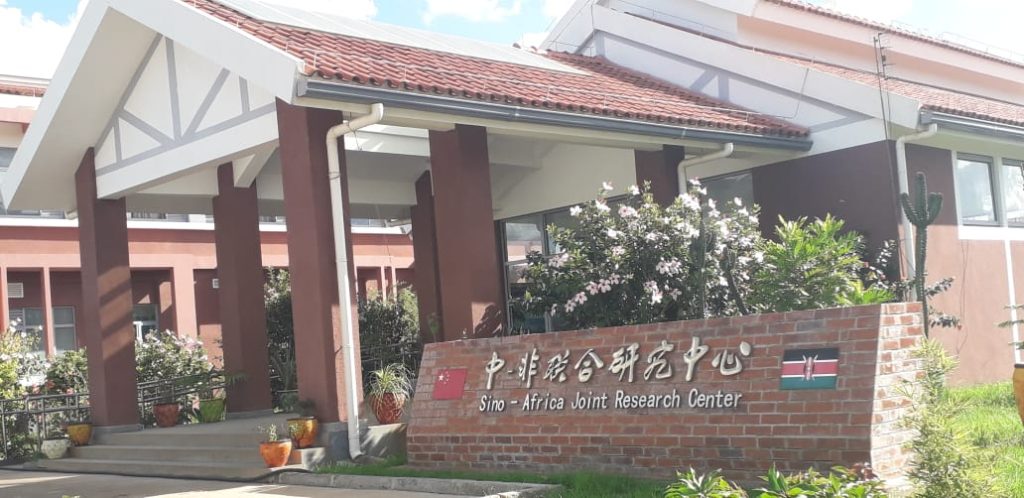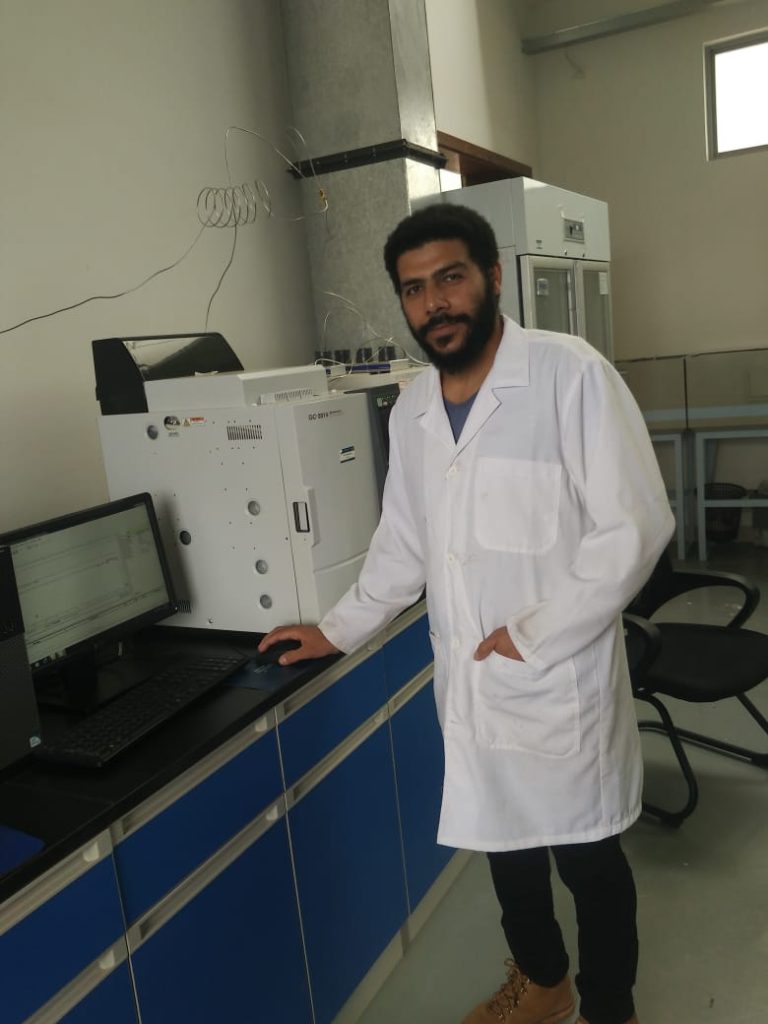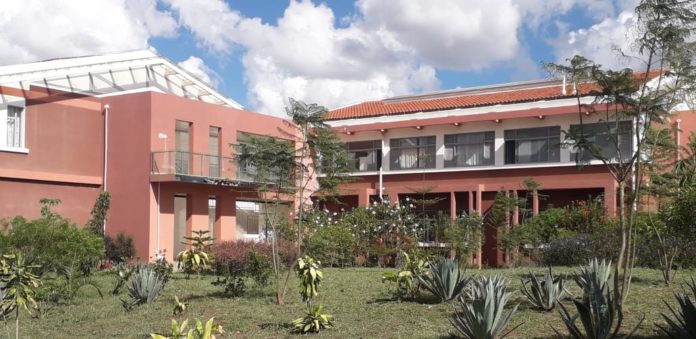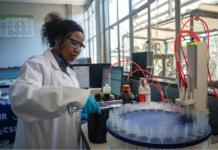By Lenah Bosibori
The Sino Africa Joint Research Center (SAJOREC) is a state-of-the-art complex with fully equipped laboratories, accommodation facilities and a pristine botanical garden.
This facility that is hosted at the Jomo Kenyatta University of Agriculture and Technology (JKUAT) in Nairobi was established through collaboration between Professor Wang Qingfeng who is affiliated with Chinese Academy of Sciences (CAS) and his Kenyan counterpart, Professor Robert Gituru
Professor Gituru, the Kenyan director of SAJOREC, teaches at JKUAT and pursued his postgraduate studies in China.
SAJOREC, located about 20 kilometers outside the Kenyan capital Nairobi, is a government-to-government project that seeks to promote Sino-Africa cooperation in scientific research and innovation.
Construction of the facility that sits on a 40-acre piece of land started in 2013 and was officially handed over to JKUAT in 2016.
According to Prof Gituru, the facility is run jointly by CAS and JKUAT in training researchers but employers are paid by the University.
“The facility is now under the management of JKUAT, all its employees are paid by the university,” added Gituru.
“The main purpose of SAJOREC is to promote collaborative research between Kenyan, African and Chinese researchers for purposes of developing products and innovations that help to solve problems facing mankind the world over as we strive to make the lives of humanity better day by day,” said Prof Gituru during a recent interview.
Some of this problems facing mankind are; post-harvest loses in agriculture, bacteria yield in plants like tomatoes and potatoes and water hyacinth that is affecting Lake Victoria, it has made smother aquatic life by deoxygenating the water and reducing its nutrients for young fish in sheltered bays.

SAJOREC is in the frontlines of looking for solutions through its water and resource management lab to see how the hyacinth can be removed completely to benefit the Kenyan community retain its fresh water Lakes.
Farmers loss up to 40 per cent of their produce, to solve this problem Mostafa Elbagoury a researcher from Egypt who is currently at SAJOREC carrying out a project known as biochemical and molecular analysis of chilling injury on banana fruit.
“I am working on a project that will help delay the ripening of bananas, increase the quality of the fruit and decrease the resistant of this fruit against stress,” said Mostafa in an interview at SAJOREC.
SAJOREC has provided him with the facilities he requires for his research that takes three years to complete, one of this facilities is the labs that are fully equipped with what he needs.
“I am using three of the six labs at SAJOREC to undertake my research, the labs are water and resource management, microbiology and molecular labs,” added Mostafa.

Another researcher that is benefiting from SAJOREC is Njau Njeri, she is doing a research on bacteria wilt.
“This is a disease of plants in the category of tomatoes and potatoes which has affected farmers widely,” said Njeri.
She adds that she is carrying out her research to help farmers improve on the yield, get more income and increase the quantity after she comes up with a solution.
According to her, SAJOREC is helping her in the labs where she can easily extract the DNA of bacteria easily.
“I use SAJOREC labs to extract DNA from the bacteria and amplify it, Chinese researchers helps me in doing this because sometimes you find the machines in the labs quite unique from the ones I am used to,” added Njeri.
According to researchers, SAJOREC is greatly helping them with unique labs that have everything they require for their research,
According to the institution’s publication, so far there is no complete research that has been presented, students are ongoing with their research which takes about four to five years to come up with an innovation.
SAJOREC’s pristine botanical garden is also another exciting area for photo session for those people who love photography.
Gituru adds that the center focuses mainly on six research themes and also offers scholarships to students from all over Africa to go and study in China for four years.
The laboratories are as follows:
- Biodiversity conservation and utilization, one of the biggest labs where Prof Gituru is the principle investigator together with Prof Wang from China.
- Modern agricultural demonstration zone focusing on skills and technology transfers in agriculture for purposes of raising food production not only in Kenya but also in Africa.
- Geomatic Information System (GIS) and remote sensing and monitoring laboratory focusing on art sciences especially issues to do with land use and disaster mitigation
- Microbiology laboratory focusing on a number of research projects especially mitigation of infectious diseases.
- Natural products laboratory where scientists strive to study flora and fauna of Africa as well as other parts of the world with a view to developing useful products from nature.
- Lastly, a laboratory for water resources management that aims to help countries become water secure amid increasing demand.
“We also intend to establish a ground receiving data station associated with the modern agricultural demonstration zone laboratory with the support of the Digital and Remote Sensing Institute of the Chinese Academy of Sciences in Beijing,” adds Gituru.
SAJOREC is therefore focusing on sustainable use and protection of water resources globally.
“So far we have managed to conduct research in our modern agricultural demonstration zone where we have transferred knowledge and skills from China to Africa with the purpose of raising crop productivity,” says Gituru.
Gituru adds that progress has been very good and the facility is on the verge of unleashing immense benefits to students and local communities.
Students who wish to get scholarships to study in China may apply from February to April every year.
So far, SAJOREC has provided scholarships to over 149 students from Africa to pursue master’s or PhD degrees most of whom are from Kenya.
In 2017, thirteen JKUAT students and staff in various science-related disciplines benefited from the scholarships.
Over 160 scientists and senior technicians from 13 African countries have also been trained since the inception of SAJOREC.
SAJOREC has benefited 60 African students with scholarships to study at the Chinese Academy of Sciences (CAS) for their postgraduate degree courses.
So far the facility has one student from the Pan African University based in Egypt.
The facility has provided job opportunities to more than 20 employees who are directly employed and others indirectly employed. This includes people working in the accommodation areas, gatemen, gardeners, cooks and many more.
Among the beneficiaries is Elizabeth Kamande, a master’s student in microbiology. Kamande received her scholarship in 2013 immediately after she completed her undergraduate degree in microbiology; she has been in China for four years.
“I thank the Director Prof Gituru who is the pioneer of the project for bringing such an exclusive center here, it has enabled me to get a job without hustling,” said Kamande who is helping other researchers at SAJOREC.
After completing her masters degree in China, Kamande returned to Kenya and secured a job at SAJOREC where she is involved in cutting edge research.
The Vice Chancellor of JKUAT, Prof Victoria Ngumi in a statement said that SAJOREC has evolved into a key research hub for the whole of Africa.
“Our institution has become a modern hub not only in Kenya but the entire Africa, many researchers have benefited and now they are the ones training our students,” reads part of Ngumi’s statement.
“JKUAT stands out as a unique institution to have this facility built on it. We are lucky to have been chosen for this big project, we provided the land and they gave us money for construction, we are happy since we have no loan to repay,” said Patrick Amunavi, Senior Corporate Communications Officer at JKUAT.
This work was produced as a result of a grant provided by the Africa-China Reporting Project managed by the Journalism Department of the University of the Witwatersrand.














